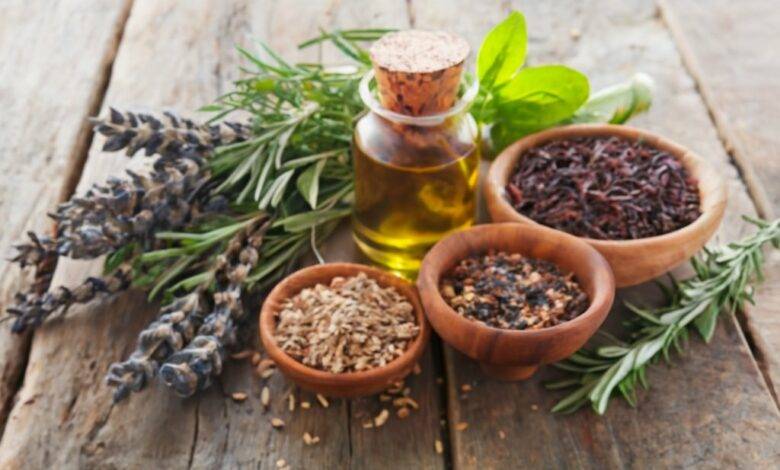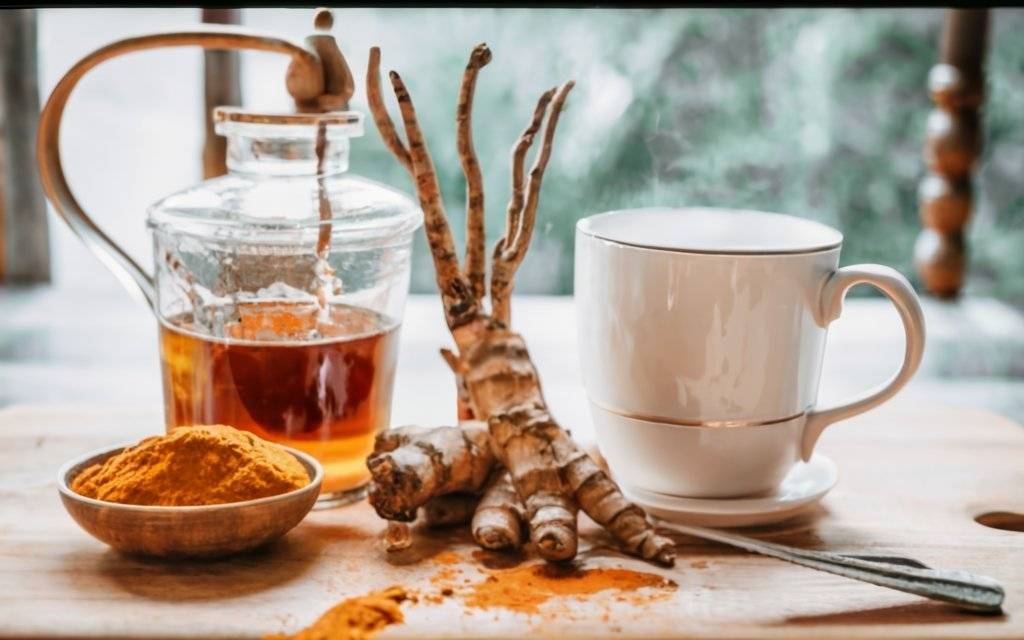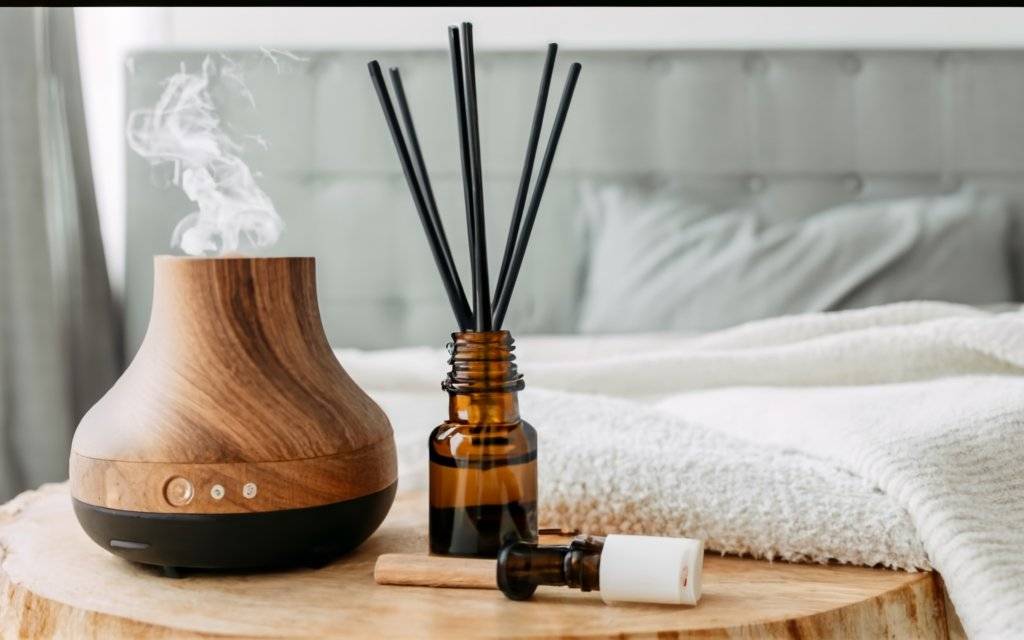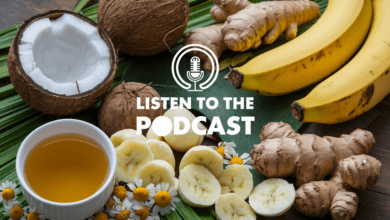10 Natural Herbs To Get Rid Of Headaches

Article Updated by Dave James, 30/12/24
Herbs for headaches offer natural solutions to ease discomfort and restore balance to your day. Headaches can disrupt your daily routine, transforming simple tasks into significant challenges. That familiar sensation—pressure around your temples or a throbbing pain—can make you want to withdraw from the world.
In today’s fast-paced world, it is crucial to unearth rapid yet holistic methods to combat this widespread affliction effectively.
Were you aware that feverfew, an herb adorned with daisy-like blossoms, possesses more than just aesthetic value? It contains potent compounds that have been associated with reducing the frequency and intensity of headaches. Our comprehensive article will provide you with insights into ten such herbs renowned for their ability to soothe headaches and guide you on their optimal usage for relief.
We will delve into effective hydration techniques, lifestyle adjustments for prevention, and diverse herbal remedies—all meticulously crafted to alleviate your discomfort without relying on over-the-counter medication.
Are you prepared? Let us seek solace in finding a remedy.
Key Takeaways
- Feverfew is an anti-inflammatory herb that may reduce migraine frequency and intensity, offering a natural alternative to traditional medications.
- Ginger contains gingerol, which has analgesic properties and can help lower pain perception in headaches; it can be consumed as tea, supplements, or added fresh in cooking.
- Peppermint essential oil provides a cooling sensation on the skin and can alleviate tension when applied topically or used in aromatherapy for headache relief.
- Staying hydrated by drinking plenty of water every day helps prevent dehydration-related headaches. Women should aim for about 2.7 liters and men for about 3.7 liters from all beverages and foods daily.
- Rosemary not only adds flavor to food but also promotes cognitive sharpness with its aroma, potentially helping with headaches linked to mental fatigue or stress.
Understanding Headaches: Types and Triggers

Headaches can be triggered by various factors, including tension, migraines, and cluster headaches. Understanding the different types and their triggers is essential for choosing the right natural remedy.
Tension Headaches
Tension headaches are common and can really put a damper on your day. They often feel like a tight band around the head, causing mild to moderate pain that can last for hours or even days.
Stress and anxiety frequently trigger these types of headaches, but other factors such as fatigue, dehydration, hormonal shifts, and missing meals also play roles. Living well means recognizing these triggers and finding ways to manage them.
Natural remedies have proven effective in addressing the discomfort caused by tension headaches. Hydration is key; drinking plenty of water helps prevent dehydration-related headaches.
Applying essential oils like peppermint oil or lavender oil topically can offer relief from head pain by providing soothing aromatherapy benefits. Additionally, incorporating B-complex vitamins into your diet supports overall wellness while helping to fend off headache symptoms that stem from nutritional deficiencies.
For persistent issues with tension-type headaches, consulting healthcare professionals who specialize in natural treatments, such as chiropractors or acupuncturists, could provide further relief through targeted therapies.
Migraine Headaches
Moving from tension headaches, another debilitating type often faced is migraine headaches. These are not your ordinary headaches, but intense throbbing sensations typically affecting one side of the head.
They may bring along unwelcome companions like nausea, sensitivity to light and sound, and visual disturbances known as auras. Migraines strike without warning, potentially disrupting daily life for anyone unfortunate enough to experience them.
For those seeking relief from migraine attacks, research suggests turning to natural methods such as aromatherapy with lavender oil and applying peppermint oil for soothing effects.
Butterbur has emerged as a promising herb in reducing the frequency of these painful episodes. Women tend to be more affected by migraines than men, facing them at thrice the rate.
Managing migraines calls for holistic strategies that include lifestyle adjustments—prioritizing sleep quality, managing stress effectively—and possibly incorporating beneficial supplements like magnesium or vitamin B complex into one’s diet can help maintain everyday health and well-being.
Cluster Headaches
Cluster headaches strike with excruciating pain, often described as a piercing sensation on one side of the head. Unlike other headache disorders, these attacks happen in patterns or clusters, making them somewhat predictable yet incredibly challenging to endure.
Sufferers may experience restlessness and discomfort during an episode. Research is focusing on whether natural remedies can bring relief, including peppermint oil’s cooling effects or lavender oil’s calming properties.
Finding effective treatments involves understanding your triggers. Some individuals report that alcohol and certain foods set off their cluster headaches, while others point to strong smells and bright lights as culprits behind the intense pain.
Adjusting sleep patterns might also help prevent these painful episodes. However, since each case is unique, it’s important to consider all potential factors contributing to cluster headaches.
Transitioning smoothly into exploring hydration’s role in headache management will offer another dimension to the quest for relief.
The Power of Hydration: Water as a Simple Remedy

Drinking plenty of water each day can play a key role in preventing and alleviating headaches. Dehydration is a common trigger for tension and migraine headaches, as it affects how your body functions.
When you’re not getting enough fluids, your brain can temporarily contract or shrink from fluid loss. This mechanism causes the brain to pull away from the skull, leading to pain and resulting in a dehydration headache.
To keep these painful episodes at bay, make sure you consume adequate amounts of water throughout the day. Experts recommend women drink about 2.7 liters (91 ounces) and men about 3.7 liters (125 ounces) of fluids per day from all beverages and foods—a guideline that includes water-rich fruits like watermelon and cucumber, which contribute to overall hydration levels too.
Regularly sipping on water can also dilute substances in your bloodstream that may trigger migraines, providing an easy yet effective tool for maintaining your well-being without any side effects often associated with medications.
Harnessing Herbal Solutions: 10 Natural Herbs for Headache Relief

Feverfew, ginger, peppermint, lavender, butterbur, turmeric, willow bark, chamomile, ginkgo biloba, and rosemary are just a few of the natural herbs that can provide relief from headaches.
Learn more about how these powerful remedies can help alleviate your pain.
Feverfew: Nature’s Migraine Fighter
Feverfew is a natural herb renowned for its ability to combat migraines and tension headaches. It contains anti-inflammatory properties that can provide relief from these debilitating conditions.
Incorporating feverfew into your holistic approach to headache management may reduce the frequency and intensity of migraines, offering an alternative to traditional medications.
Research supports the use of feverfew as a potent migraine fighter, making it an attractive option for individuals seeking natural remedies. By harnessing the power of this herbal supplement, individuals can embrace a more holistic approach to managing their headache symptoms.
Ginger: The Anti-Inflammatory Root
Ginger contains gingerol, an active compound that boasts anti-inflammatory and analgesic properties. These properties can help reduce the frequency and severity of headaches by inhibiting inflammatory pathways and lowering pain perception.
With its natural approach to alleviating pain, incorporating ginger into your lifestyle through teas, supplements, or fresh root in cooking can support headache relief without relying on traditional medications.
Ginger may serve as a natural alternative to conventional headache treatments due to its ability to ease inflammation and diminish pain perception. Its versatility allows for consumption in various forms, including teas or dietary supplements, providing individuals with flexible options for integrating this potent herb into their daily routines.
Peppermint: Soothing Aromatherapy
Peppermint essential oil has been utilized for centuries to alleviate headaches due to its soothing aroma. The menthol in peppermint can provide a cooling sensation when applied topically, relieving tension and promoting relaxation.
Aromatherapy using peppermint oil may also help reduce nausea and improve focus, making it a versatile option for headache relief.
Additionally, diffusing peppermint essential oil can create a refreshing environment that supports mental clarity and eases discomfort caused by headaches. Whether applied directly or diffused in the air, the invigorating scent of peppermint offers a natural approach to managing headache symptoms without relying on medications or invasive treatments.
Lavender: Relaxing Fragrance
Transitioning from the soothing aromatherapy of peppermint, we delve into the relaxing fragrance of lavender, a widely recognized herb for its calming properties. Lavender offers more than just a pleasant scent—it’s known for its stress-reducing effects and has been used to alleviate headaches for centuries.
Research suggests that inhaling lavender essential oil may help reduce headache intensity and frequency, making it a valuable addition to your natural headache relief toolkit.
This fragrant herb has been linked to reducing anxiety levels, promoting better sleep quality, and ultimately aiding in headache management. Incorporating lavender into your daily routine through aromatherapy or topical applications can potentially provide relief from both tension headaches and migraines.
Butterbur: Preventive Potential
Butterbur exhibits preventive potential for headaches, particularly migraines. Studies have shown that it can reduce the inflammatory effect of chemicals responsible for triggering headaches.
For instance, a study conducted at Albert Einstein College of Medicine reported a 48% reduction in migraine attack frequency with the intake of 75 milligrams of butterbur twice a day.
These findings highlight the promising role of butterbur as a preventive measure for individuals seeking natural remedies to manage their headache symptoms.
Turmeric: Curcumin’s Pain Relief

Turmeric, a vibrant orange spice commonly found in curry dishes, contains curcumin, which has shown promise as a natural pain reliever. Research suggests that curcumin possesses potent anti-inflammatory and antioxidant properties, making it an effective herb for combating headaches.
When consumed regularly, turmeric may proactively reduce the frequency and intensity of headaches. Its anti-inflammatory effects can help alleviate headache-related discomfort by targeting underlying inflammation.
Curcumin’s ability to modulate neurotransmitters and combat oxidative stress makes it a promising option for those seeking natural relief from headaches. Studies have indicated that curcumin acts on various pathways associated with pain perception, potentially offering significant benefits for individuals dealing with chronic or recurring headaches.
Willow Bark: Nature’s Aspirin
Transitioning from the pain relief benefits of turmeric, willow bark offers nature’s version of aspirin. Derived from the willow tree, this herb contains salicin, a compound similar to aspirin.
It effectively reduces inflammation and eases headaches, providing a natural alternative for those seeking relief without pharmaceutical medication. Willow bark has been recognized for centuries as an herbal remedy due to its analgesic properties and can be harnessed as part of an integrative approach to managing headache symptoms.
Chamomile: Stress Reducer
Chamomile has been traditionally used to ease tension and promote relaxation. It contains beneficial plant compounds that support normal inflammatory function, making it an effective natural remedy for stress management and occasional anxiety relief.
Whether in the form of essential oil, tea, tincture, or compress, chamomile can be recommended for headache relief. Moreover, it’s associated with promoting healthy digestion and supporting digestive health, adding to its potential as a holistic wellness aid.
Research has shown that chamomile is linked with reducing stress levels while also aiding in overall relaxation. This makes it a valuable addition to stress management techniques and lifestyle modifications designed to improve well-being.
Ginkgo Biloba: Circulation Enhancer
Ginkgo Biloba enhances circulation, which can support headache relief by improving blood flow to the brain. This herb has been linked to potential benefits for managing headaches and migraines, particularly those caused by poor circulation.
Incorporating Ginkgo Biloba into your natural headache relief regimen may help address underlying issues related to circulation, promoting overall well-being and potentially reducing the frequency or severity of headaches.
Furthermore, Ginkgo Biloba’s potential to improve cognitive function and mental clarity could also contribute to a more comprehensive approach to relieving headaches. By enhancing circulation and supporting neurological function simultaneously, this herb offers a holistic solution that aligns with a natural lifestyle conducive to better health outcomes.
Rosemary: Cognitive Sharpness
Rosemary exudes a distinctive aroma and boasts cognitive benefits. Its scent can enhance memory and concentration, promoting cognitive sharpness. Incorporating rosemary into your daily routine through cooking or aromatherapy may help bolster mental acuity, offering a natural remedy for maintaining focus and mental clarity.
Rosemary’s potential association with improved brain function makes it an intriguing herbal option in the pursuit of holistic well-being. Embracing this herb not only adds flavor to culinary creations but also contributes to cognitive vitality, aligning with a natural approach to enhancing mental acuteness.
Integrating Herbs into Your Lifestyle

Incorporating natural herbs into your daily routine can be as simple as enjoying herbal teas, using topical applications, or utilizing aromatherapy. These methods can easily fit into your lifestyle and provide a natural approach to managing headaches.
Herbal Teas
Herbal teas can offer soothing relief for headaches and migraines due to their natural pain-relieving properties.
- Chamomile Tea: Known for its calming effects, chamomile tea has been studied for its efficacy in treating migraines and headaches, particularly migraines without aura.
- Passionflower Tea: This herbal remedy is believed to help ease headache discomfort and support the body’s natural pain-relieving abilities.
- Turmeric Tea: With its anti-inflammatory properties, turmeric tea may provide relief from headache symptoms.
- Boswellia Tea: Also known as frankincense, this herbal tea has been associated with reducing inflammation and may help alleviate headache discomfort.
- Ginger Tea: Ginger is a well-known anti-inflammatory herb that can be brewed into a comforting tea to help manage headache pain.
- Peppermint Tea: The soothing properties of peppermint can provide relief from tension headaches when consumed as a warm beverage.
- Lavender Tea: Lavender’s relaxing fragrance can be infused into a calming tea that may help alleviate stress-related headaches.
- Ginkgo Biloba Tea: Ginkgo biloba is believed to enhance circulation, potentially aiding in relieving certain types of headaches.
- Rosemary Tea: This fragrant herb contains compounds that support cognitive sharpness, which could assist in managing headaches caused by mental fatigue or stress.
- Butterbur Tea: Butterbur has shown preventive potential for migraines and may be consumed in tea form for headache management.
Topical Applications
Topical applications can be a convenient and effective way to harness the benefits of herbs for headache relief. Here are different ways to integrate topical applications into your lifestyle:
- Peppermint oil: Applying diluted peppermint oil to the temples and forehead can help alleviate tension headaches due to its analgesic properties.
- Lavender oil: Massaging diluted lavender oil onto the temples or inhaling its aroma can provide relief from migraines, thanks to its calming effects.
- Eucalyptus oil: Rubbing diluted eucalyptus oil onto the chest or temples may help ease tension-related headaches by promoting relaxation.
- Ginger compress: Creating a warm ginger compress and placing it on the forehead can aid in alleviating headache symptoms by reducing inflammation.
- Herbal balms: Using herbal balms containing ingredients like chamomile, turmeric, or rosemary can provide soothing relief when applied topically to areas of discomfort.
- Roll-on blends: Utilizing roll-on blends containing essential oils such as peppermint, lavender, and rosemary can offer convenient relief for headaches while on-the-go.
- Scalp massage oils: Massaging the scalp with herbal-infused oils like chamomile or ginkgo biloba may help release tension and promote relaxation to alleviate headaches.
- Aromatherapy inhalers: Inhaling herbal aromatherapy blends with ingredients like peppermint, lavender, or chamomile can offer quick relief from headache symptoms.
Aromatherapy

Aromatherapy involves using essential oils to alleviate headache symptoms and promote relaxation. It can be effective in providing relief from headaches through natural remedies and practices.
- Essential Oils: Peppermint and lavender essential oils can be used topically to provide relief from headache symptoms due to their soothing and analgesic properties.
- Diffusers: Aromatherapy diffusers can disperse essential oils into the air, creating a calming atmosphere that may help reduce headache discomfort.
- Inhalation: Inhaling essential oils directly or through steam inhalation can have a relaxing effect, potentially easing tension that contributes to headaches.
- Blending Oils: Creating personalized blends of essential oils tailored to individual preferences and needs can enhance the effectiveness of aromatherapy for headaches.
- Application Techniques: Understanding proper application techniques for different essential oils is crucial for maximizing their benefits in alleviating headaches.
- Safety Precautions: It’s important to dilute essential oils appropriately and follow safety guidelines when using aromatherapy for headache relief.
- Personalization: Experimenting with various essential oils and aromatherapy methods can help individuals determine the most effective approach for managing their headaches.
- Combining with Other Remedies: Aromatherapy can complement other natural remedies and practices, such as herbal teas or topical applications, for comprehensive headache relief strategies.
Dietary Supplements
Supplementing with dietary herbs and vitamins can support natural headache relief. Incorporate the following dietary supplements into your routine to help manage and prevent headaches:
- Magnesium: Studies have shown that magnesium deficiency may contribute to migraines. Taking magnesium supplements can help reduce the frequency and severity of migraines.
- B Vitamins: Riboflavin (B2), folate, B12, and pyridoxine (B6) are essential for neurological function and may reduce headache symptoms when taken as supplements.
- Coenzyme Q10: This supplement has been found to be effective in reducing the frequency, severity, and duration of migraines.
- Ginger Root: Known for its anti-inflammatory properties, ginger root supplements can aid in alleviating headache pain.
- Omega-3 Fatty Acids: These healthy fats found in fish oil or flaxseed oil have anti-inflammatory properties that might help reduce headache severity.
- Dong Quai: This herb is traditionally used in Chinese medicine to ease headache discomfort.
- Ginkgo Biloba: Enhancing circulation, ginkgo biloba may benefit those who experience headaches related to poor blood flow.
- Turmeric: Curcumin, the active compound in turmeric, has natural pain-relieving properties that may offer relief from headaches.
- Chamomile: Often consumed as an herbal tea, chamomile’s stress-reducing effects can potentially ease tension headaches.
- Butterbur: With preventive potential, butterbur supplements have been linked to a reduction in migraine frequency and severity.
Additional Natural Remedies to Consider
In addition to herbal remedies, there are various other natural approaches that can help alleviate headaches. Adequate sleep, stress management techniques, and regular physical activity are key components of a holistic approach to headache relief.
Integrating these practices into your lifestyle can provide additional support in managing and preventing headaches.
Adequate Sleep
Adequate sleep plays a crucial role in maintaining overall health. Studies have shown that getting enough quality sleep can lead to a reduction in both the frequency and severity of headaches.
Lack of sleep can trigger migraines and tension headaches, making it essential to prioritize restful slumber as part of headache management. Incorporating good sleep hygiene practices, such as maintaining a regular sleep schedule, creating a comfortable sleeping environment, and managing stress levels, can significantly contribute to reducing the occurrence of debilitating headaches.
Moreover, ensuring sufficient sleep duration is also linked to improved cognitive function, emotional well-being, and overall quality of life. By prioritizing adequate and consistent sleep patterns, individuals may experience fewer disruptions from headaches while reaping the numerous benefits associated with healthy sleeping habits for their general well-being.
Stress Management Techniques
Participating in regular physical activity helps reduce stress and promotes relaxation. Yoga therapy, for example, encourages mindfulness and deep breathing to calm the mind. Engaging in activities that you enjoy can distract from daily stressors and contribute to your overall emotional well-being.
Incorporating adequate sleep into your routine is essential for managing stress levels. Sleep deprivation not only impacts cognitive function but also amplifies emotions that may lead to increased stress.
Prioritizing a good night’s rest can provide substantial relief from daily pressures and tensions.
Regular Physical Activity
Regular physical activity plays a crucial role in managing and preventing headaches. Engaging in regular exercise has been shown to reduce the frequency and intensity of headaches.
Studies have revealed that moderate aerobic exercises, such as brisk walking, cycling, or swimming, release endorphins – natural painkillers produced by the body – which can help alleviate headache symptoms.
Additionally, engaging in physical activity helps improve blood circulation and reduces stress levels, both of which are known triggers for headaches.
Precautions and When to Consult a Professional
Always consult a healthcare professional before trying herbal supplements or alternative therapies, as natural substances can lead to side effects. It’s crucial to be aware of potential interactions with any medications you are currently taking and to seek guidance on appropriate dosages for optimal safety and effectiveness.
The article underscores the significance of tending to regular meals, staying well-hydrated, and avoiding known food triggers. This proactive approach can play an essential role in preventing headaches and migraine attacks by helping to maintain stable blood sugar levels and minimizing potential dietary triggers that may contribute to headache onset.
FAQs About Natural Headache Remedies
- What are the potential side effects of herbal remedies for headaches?
- Can I combine different herbs to create a more effective remedy for my headaches?
- Are herbal supplements safe for long-term use in managing headaches?
- How can I incorporate herbal teas into my daily routine to help alleviate headaches?
- Are there specific dietary restrictions or recommendations when using natural herbs for headache relief?
- What are the recommended dosages for herbal supplements in managing headache symptoms?
- Can I use essential oils topically or through aromatherapy to treat my headaches, and if so, how should I use them effectively?
- Are there any potential interactions between herbal remedies and prescription medications commonly used to manage headaches?
By understanding these FAQs about natural headache remedies, you can make informed decisions about incorporating these natural solutions into your lifestyle.
Conclusion: Embracing a Natural Approach to Headache Relief
In conclusion, embracing a natural approach to headache relief involves harnessing the power of 10 effective herbs. These herbal solutions, such as feverfew for migraines and ginger for inflammation, offer practical and efficient methods to alleviate headaches.
By integrating these herbs into your lifestyle through teas, topical applications, and aromatherapy, you can experience their potential benefits. Emphasizing the importance and impact of these natural remedies showcases how they can lead to significant improvements in managing headaches.
Readers may explore additional resources or further readings to continue learning about natural headache relief techniques beyond this article. Remember that experimenting with different herbs can help identify the most effective remedy for individual headache relief needs.
FAQs
1. What natural herbs can help with headaches?
Herbalists recommend herbs like feverfew and butterbur to ease headache pain, as well as magnesium supplements, which some people find effective for reducing chronic migraines.
2. Can vitamins prevent migraine headaches?
Yes! Vitamins such as Vitamin B2 (riboflavin), Vitamin B6, and Coenzyme Q10 (CoQ10) have been shown to potentially reduce the frequency of migraine headaches when taken regularly.
3. Is acupuncture effective in treating headaches?
Acupuncture, a practice of Traditional Chinese Medicine (TCM), has helped many people find relief from both tension-related headaches and more severe migraines by targeting specific points on the body.
4. How does diet affect migraines and chronic headache conditions?
Certain foods may trigger migraines or chronic headaches due to food sensitivities; following a gluten-free diet or avoiding histamine-rich foods might alleviate symptoms for individuals with these triggers.
5. Are there any lifestyle changes that might help with managing frequent headaches?
Incorporating stress-reducing techniques such as yoga or meditation, making sure you get enough sleep each night, staying hydrated, and getting regular exercise can all contribute to fewer headache days.
6. Could chiropractic care be a solution for my headache problems?
Chiropractic manipulation or spinal manipulation therapy provided by licensed practitioners may offer relief for some suffering from tension-type headaches or those linked to neck issues.
Are you searching for herbs that can help with headaches? Have you tried everything to cure your headache, but nothing seems to work? Herbs have been used for centuries to treat many different types of ailments. Headaches are one of the most common health issues that people experience regularly. This is a frustrating and painful condition that affects people of all ages. Many different factors can cause headaches, but herbs are an effective way to treat these symptoms naturally. This post will discuss ten herbs that work well for headache relief.



